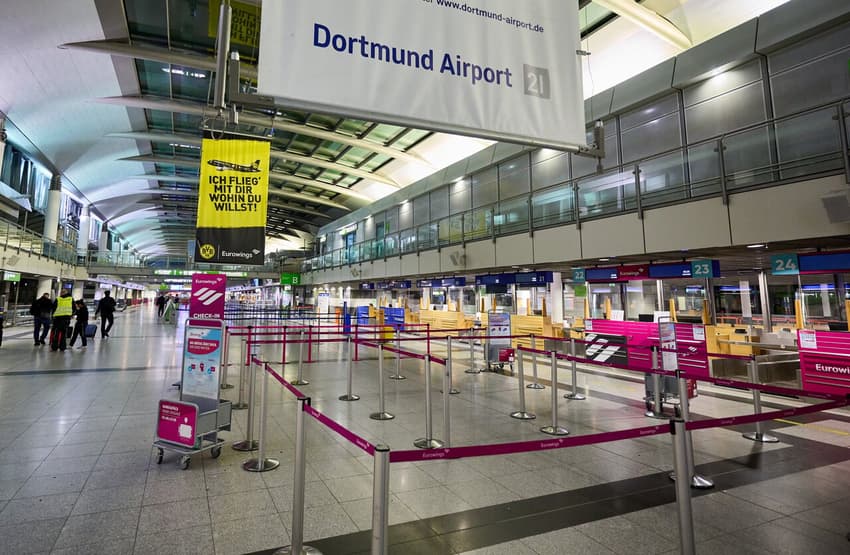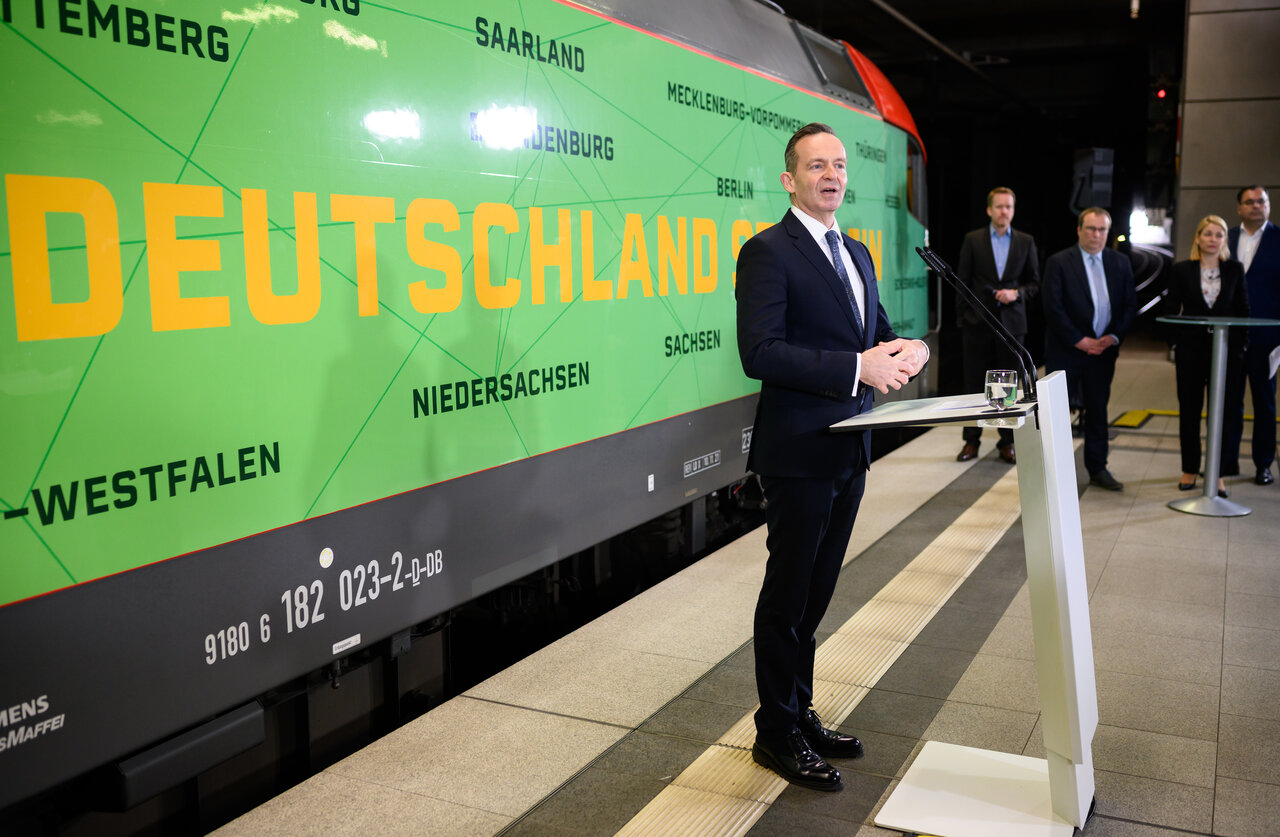'We need an Easter truce': How strikes have sparked a bitter row in Germany

As fresh strikes hit Germany's transport sector on Friday, we look at what we can expect in the coming weeks, amid growing calls for industrial action to be put on pause during Easter.
What's the latest on strikes?
Strikes are continuing in Germany, with airport security staff walking out on Friday in Hanover, Dortmund, Weeze, Dresden and Leipzig, and at Karlsruhe/Baden-Baden for the second day in a row.
A strike on Thursday took place at five airports around Germany, and led to thousands of cancelled flights. At Berlin Brandenburg (BER) all departing flights were axed.
Germany's largest airport in Frankfurt was not affected by the warning strikes on either day, but was hit by a Lufthansa cabin crew strike on Tuesday and Wednesday which led to flight delays and cancellations.
Meanwhile, a three-day strike is taking place on local public transport in Frankfurt and Hesse. It started on Wednesday and is set to run through the end of the night shift on Saturday morning.
READ ALSO: Why Germany is being hit by strikes almost every day
How long will strikes continue?
With no definite signs of the action easing up, people in Germany are wondering how long the current wave of strikes, affecting sectors from public transport and retail to childcare, will continue.
The German Train Drivers' Union (GDL) recently said it would be announcing strikes at short notice, putting more pressure on Deutsche Bahn.
It comes as many are preparing to travel for Germany’s four day Easter weekend that includes two public holidays on Friday, March 29th and Monday, April 1st.
With the possibility of strikes threatening nationwide and local transport as well as flights, there are fears that plans will be thrown into disarray.
GDL boss Claus Weselsky has not ruled out industrial action over this period in the same way he did over the Christmas holidays in late 2023.
Transport Minister Volker Wissing, of the Free Democrats, has called on unions to refrain from industrial action in the travel sector, at least over Easter.
"I appeal to the trade unions to declare an Easter truce if the wage disputes in rail and air transport are not resolved by the start of the holidays," the minister told the Neue Osnabrücker Zeitung.
READ ALSO: How likely are strikes in Germany over the Easter weekend?
"The trade unions should make it clear in good time that there will be no strikes during the Easter period. We must also think about the needs of the population."

Transport Minister Volker Wissing (FDP), at the launch of the Deutschlandticket in April 2023. Photo: picture alliance/dpa | Bernd von Jutrczenka
Friedhelm Pfeiffer, a senior researcher at the European Centre for Economic Research based in Mannheim, told The Local's Germany in Focus podcast, he believed strikes would continue and that the unions could be successful in their fight.
As well as pushing for a salary raise to help train drivers manage the higher cost of living, the GDL is pushing for a reduced working week of 35 hours, down from 38 hours, with no loss in wages.
"I think they (the strikes) will continue, but I don't know how long," Pfeiffer said. "And the strategy of the unions is, from my point of view, to do strikes at times when it really hurts.
"And currently, they say they will strike for 24 hours and nobody knows when, and this is something that is really effective somehow."
There is some encouraging news on the strike front, though.
According to German media reports on Thursday, the Verdi union and Lufthansa have agreed to enter an arbitration process in a bid to figure out a collective agreement for ground staff, meaning further warning strikes have been put on hold - at least for now.
Will politicians step in?
As the escalation continues, calls are growing from employers urging the government to come down harder on unions by reforming the right to strike.
"The strikes in the critical infrastructure are not only annoying, they are also a brake on growth,” managing director of the Federal Association of Employers’ Associations, Steffen Kampeter, told the Rheinische Post.
"The economic damage not only affects the companies directly affected, but also the entire economy."
Kampeter described the unions' actions as "disproportionate" and called on politicians to act. "We need clear industrial action law, especially for the railways and comparable areas."
However, Chancellor Olaf Scholz earlier this week ruled out stepping in to curb strikes affecting critical infrastructure like transport.
Asked in parliament if he would consider imposing new rules, Scholz said: "In my view, no."
"The right to strike is written in the constitution... and that is a democratic right for which unions and workers have fought," said Scholz, of the Social Democrats.
The unions argue their demands are reasonable as the cost of living has gone up considerably in Germany in recent years, and working conditions have worsened due to factors like staff shortages.
READ ALSO: 'No family life': A Berlin bus driver explains why public transport workers are striking
However, it's undeniable that strikes are having a big impact on the already sluggish Germany economy.
In January, Michael Groemling of Cologne's Institute for Economic Research said nationwide train stoppages can cost up to €100 million a day to the economy.
Economics Minister Robert Habeck said this week there was "a bit too much striking" taking place and not enough work.
"And we really can't afford that at the moment."
Comments
See Also
What's the latest on strikes?
Strikes are continuing in Germany, with airport security staff walking out on Friday in Hanover, Dortmund, Weeze, Dresden and Leipzig, and at Karlsruhe/Baden-Baden for the second day in a row.
A strike on Thursday took place at five airports around Germany, and led to thousands of cancelled flights. At Berlin Brandenburg (BER) all departing flights were axed.
Germany's largest airport in Frankfurt was not affected by the warning strikes on either day, but was hit by a Lufthansa cabin crew strike on Tuesday and Wednesday which led to flight delays and cancellations.
Meanwhile, a three-day strike is taking place on local public transport in Frankfurt and Hesse. It started on Wednesday and is set to run through the end of the night shift on Saturday morning.
READ ALSO: Why Germany is being hit by strikes almost every day
How long will strikes continue?
With no definite signs of the action easing up, people in Germany are wondering how long the current wave of strikes, affecting sectors from public transport and retail to childcare, will continue.
The German Train Drivers' Union (GDL) recently said it would be announcing strikes at short notice, putting more pressure on Deutsche Bahn.
It comes as many are preparing to travel for Germany’s four day Easter weekend that includes two public holidays on Friday, March 29th and Monday, April 1st.
With the possibility of strikes threatening nationwide and local transport as well as flights, there are fears that plans will be thrown into disarray.
GDL boss Claus Weselsky has not ruled out industrial action over this period in the same way he did over the Christmas holidays in late 2023.
Transport Minister Volker Wissing, of the Free Democrats, has called on unions to refrain from industrial action in the travel sector, at least over Easter.
"I appeal to the trade unions to declare an Easter truce if the wage disputes in rail and air transport are not resolved by the start of the holidays," the minister told the Neue Osnabrücker Zeitung.
READ ALSO: How likely are strikes in Germany over the Easter weekend?
"The trade unions should make it clear in good time that there will be no strikes during the Easter period. We must also think about the needs of the population."

Friedhelm Pfeiffer, a senior researcher at the European Centre for Economic Research based in Mannheim, told The Local's Germany in Focus podcast, he believed strikes would continue and that the unions could be successful in their fight.
As well as pushing for a salary raise to help train drivers manage the higher cost of living, the GDL is pushing for a reduced working week of 35 hours, down from 38 hours, with no loss in wages.
"I think they (the strikes) will continue, but I don't know how long," Pfeiffer said. "And the strategy of the unions is, from my point of view, to do strikes at times when it really hurts.
"And currently, they say they will strike for 24 hours and nobody knows when, and this is something that is really effective somehow."
There is some encouraging news on the strike front, though.
According to German media reports on Thursday, the Verdi union and Lufthansa have agreed to enter an arbitration process in a bid to figure out a collective agreement for ground staff, meaning further warning strikes have been put on hold - at least for now.
Will politicians step in?
As the escalation continues, calls are growing from employers urging the government to come down harder on unions by reforming the right to strike.
"The strikes in the critical infrastructure are not only annoying, they are also a brake on growth,” managing director of the Federal Association of Employers’ Associations, Steffen Kampeter, told the Rheinische Post.
"The economic damage not only affects the companies directly affected, but also the entire economy."
Kampeter described the unions' actions as "disproportionate" and called on politicians to act. "We need clear industrial action law, especially for the railways and comparable areas."
However, Chancellor Olaf Scholz earlier this week ruled out stepping in to curb strikes affecting critical infrastructure like transport.
Asked in parliament if he would consider imposing new rules, Scholz said: "In my view, no."
"The right to strike is written in the constitution... and that is a democratic right for which unions and workers have fought," said Scholz, of the Social Democrats.
The unions argue their demands are reasonable as the cost of living has gone up considerably in Germany in recent years, and working conditions have worsened due to factors like staff shortages.
READ ALSO: 'No family life': A Berlin bus driver explains why public transport workers are striking
However, it's undeniable that strikes are having a big impact on the already sluggish Germany economy.
In January, Michael Groemling of Cologne's Institute for Economic Research said nationwide train stoppages can cost up to €100 million a day to the economy.
Economics Minister Robert Habeck said this week there was "a bit too much striking" taking place and not enough work.
"And we really can't afford that at the moment."
Join the conversation in our comments section below. Share your own views and experience and if you have a question or suggestion for our journalists then email us at [email protected].
Please keep comments civil, constructive and on topic – and make sure to read our terms of use before getting involved.
Please log in here to leave a comment.